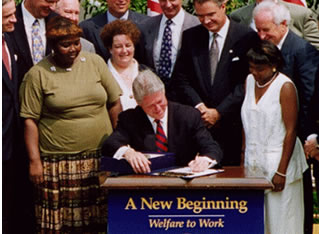
Welfare reform has reached its 10th anniversary. Many crow about its success and how wonderful it is that low-income moms are now working for a wage; they are now productive members of society. As if raising children to run this country, fight in the wars we create and teach children to become productive parents themselves is not being productive.
Some things we do know about the impact of what welfare reform has or hasn't done:
The U.S. has increased its poverty levels.
Many welfare families are now part of the working poor and children see their single parent less and less.
We have the highest infant mortality of all the world's developed nations.
Underemployment is growing by leaps and bounds.
We have exponentially raised the presence of whole families becoming homeless.
More Americans now live without health care.
A recent Princeton study on poverty says the poor age faster and have more health issues before the age of 50 because of their stressful lives. More and more older poor Americans are rearing the next generation and more children are being taken from their parents and placed into foster care.
Gov. Chris Gregoire wants to make it harder for mothers to support their children by throwing children off welfare if their mother is not complying with the welfare-to-work rules. However the state's own statistics show that more than 45 percent of non-compliance is not because mothers "want" to disobey their requirements, but because they don't have appropriate transportation, child care or clothing.
Sanctions mean that all support goes away -- funds to pay the rent, buy clothes or school supplies -- and the entire family is left to fend for itself.
We cannot fully blame the governor for being cold-hearted. There have been few studies about the so-called success of welfare. We really don't know how many Washington families left welfare and still have no job or income. We don't know if parents who start a job at $8 an hour are doing any better. What little we do know is that families that leave welfare are still struggling to make ends meet. In some hunger studies, mothers admit they go hungry so their children can eat.
The governor wants to support early learning among low-income children. How will children learn if their families are homeless because the sanction policy takes away what little is left of their safety net?
Until this society's bottom line is about the success of nurtured families to make a living wage and take care of their children, poverty most likely will continue to spread. Welfare policy should be about helping parents care for their children and move their families out of poverty rather than reducing caseload. Right now it is not looking promising that anything has been accomplished except that U.S. poverty is on the rise.
No comments:
Post a Comment